The article was prepared with the support of the EU NEIGHBORS east
"It’s not working. I have to quit. I'll be humiliated and will lose a lot of money," thought Sandro Liluashvili, the founder of Tene. His despair was hardly surprising: for a year, he had tried at least 500 to 600 times every day without success. Though he can hardly explain by what coincidence, his final, desperate attempt paid off. Sandro succeeded in creating the first Georgian USB cable.
This happened in the early months of 2020. The history of Tene, a social enterprise created by Sandro, goes back to 2019. Tene undertakes the task of gathering plastic from the environment, and transforming it into USB cables through processing. The European Union, through the Actio impact fund for social enterprise, supports Tene in expanding its business.
Tene's mission
Plastic, while durable and rather cheap, often becomes redundant after a single use. With low awareness regarding the detrimental effects of pollution, many people dispose of used plastic indiscriminately. Tene is dedicated to addressing this issue.
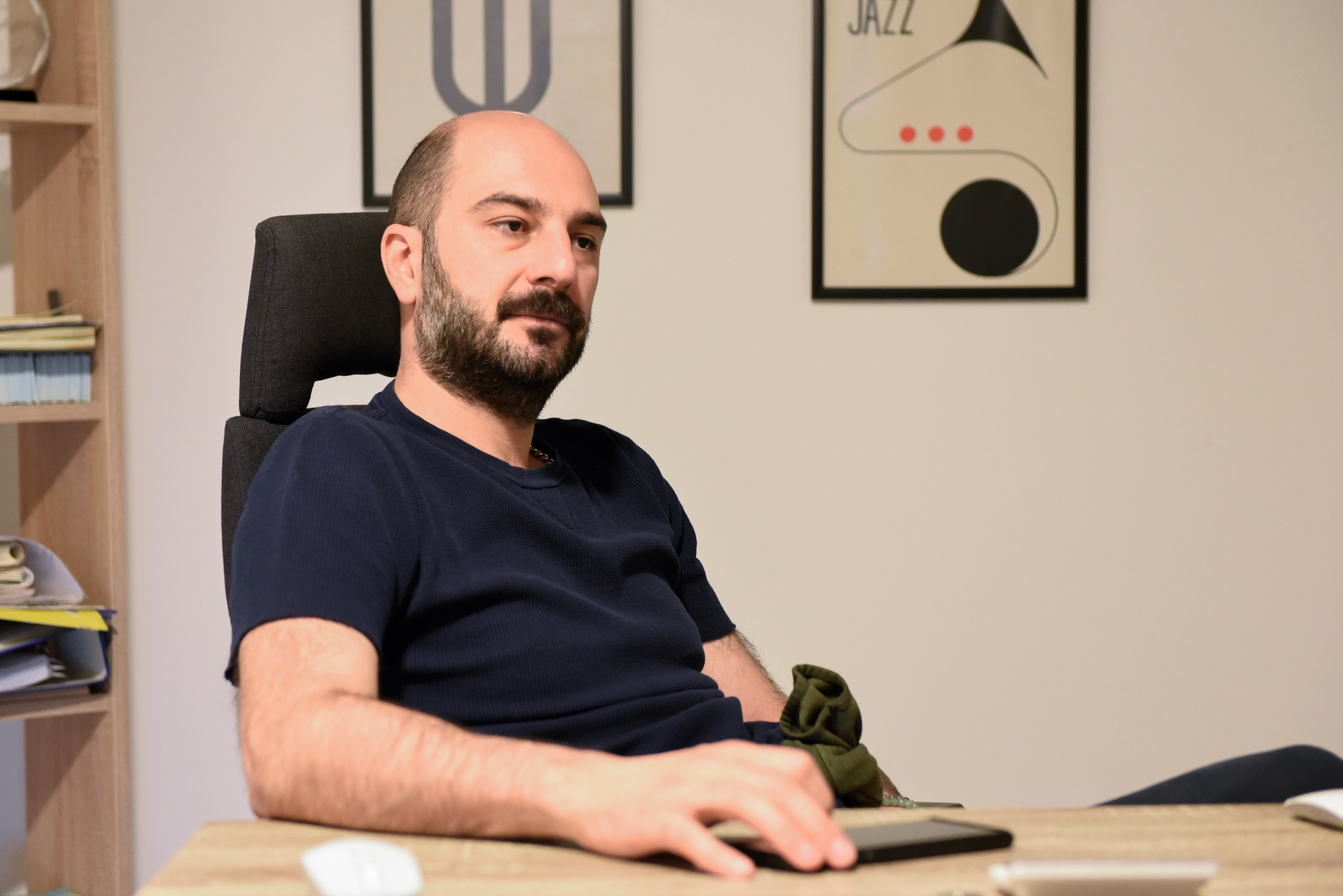
"We started setting up plastic drop boxes to facilitate plastic collection for companies. We usually retrieve plastic from their premises, transport it to our location, compress, and deliver it for recycling," Sandro explains.
It remains a considerable challenge that the general population is largely unaware of the multitude of issues that plastic pollution can cause. Tene is eager to address this issue as well.
"We work to raise public awareness, aiming to provide Georgia with a clearer understanding of the damage caused by the uncontrolled use of plastic to the Earth, the environment, humans, and their health."
Tene is also active in teaching eco-friendly principles to youth. For instance, the company arranges special sessions for schools, offering information on recycling. Additionally, they invite students and anyone interested to the factory, where they can create cables from bottle caps themselves.
The enterprise provides employment to young people displaced from Samachablo, striving to fully support their development. “In our enterprise, we exclusively employ individuals displaced from Samachablo due to the 2008 war,” Sandro explained. “We provide these young people with knowledge, create job opportunities for them, and help them as far as possible in their development.”
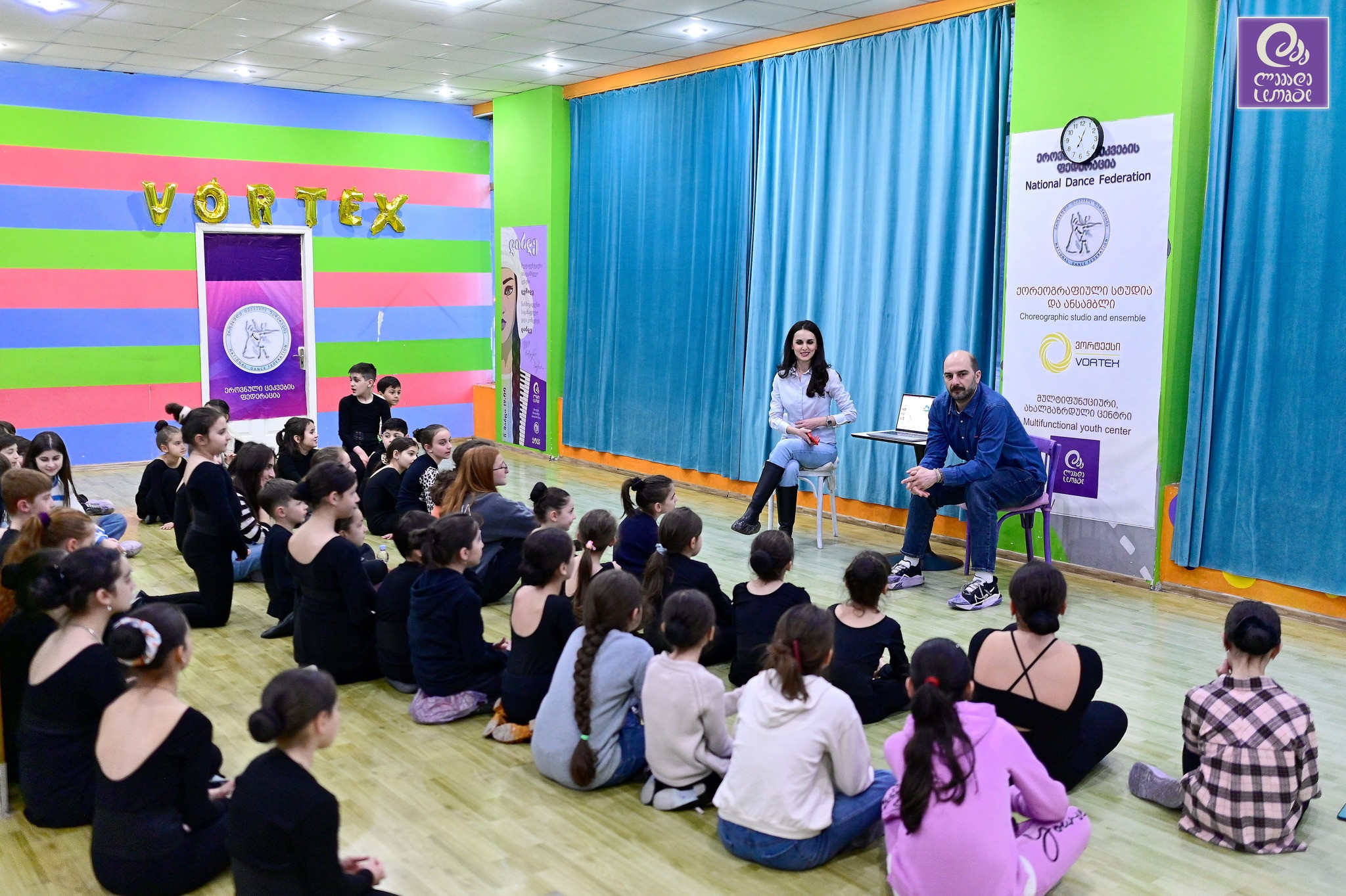
From the beginning to the present
In the first year of its activity, Tene collected approximately one and a half tons of plastic. Now, according to Sandro, the organisation gathers between six and seven tons of plastic each month. Furthermore, Tene has expanded its efforts to include the collection of tin and paper.
Such success can be partly attributed to the recently introduced reward system in Tene:
"People come, they bring plastic, and we award them points. With these points, they can buy our products and get discounts. Every day, a certain number of people come and hand over this material to us," Sandro said.
The founder of Tene credits the expansion of his operations to the funding from the European Union and assistance provided by Actio impact fund, which started in 2023. Collecting and transporting plastic bottles presents a significant challenge due to their bulk, making it difficult to transport large quantities at once. However, they have been able to address this issue with the acquisition of specialised equipment, funded by the European Union:
"In this instance, we received invaluable support from the European Union's funding and support from Actio, enabling us to procure high-pressure presses. These presses are instrumental in compacting plastic efficiently. Concurrently, we acquired trucks with spacious cargo compartments, facilitating the transportation of substantial quantities of material."
Christine Kandelaki, manager of the Actio impact fund, said the European Union and Actio had awarded a €40,000 grant to Tene, along with an additional €10,000 as a 0% loan, as well as providing technical support.
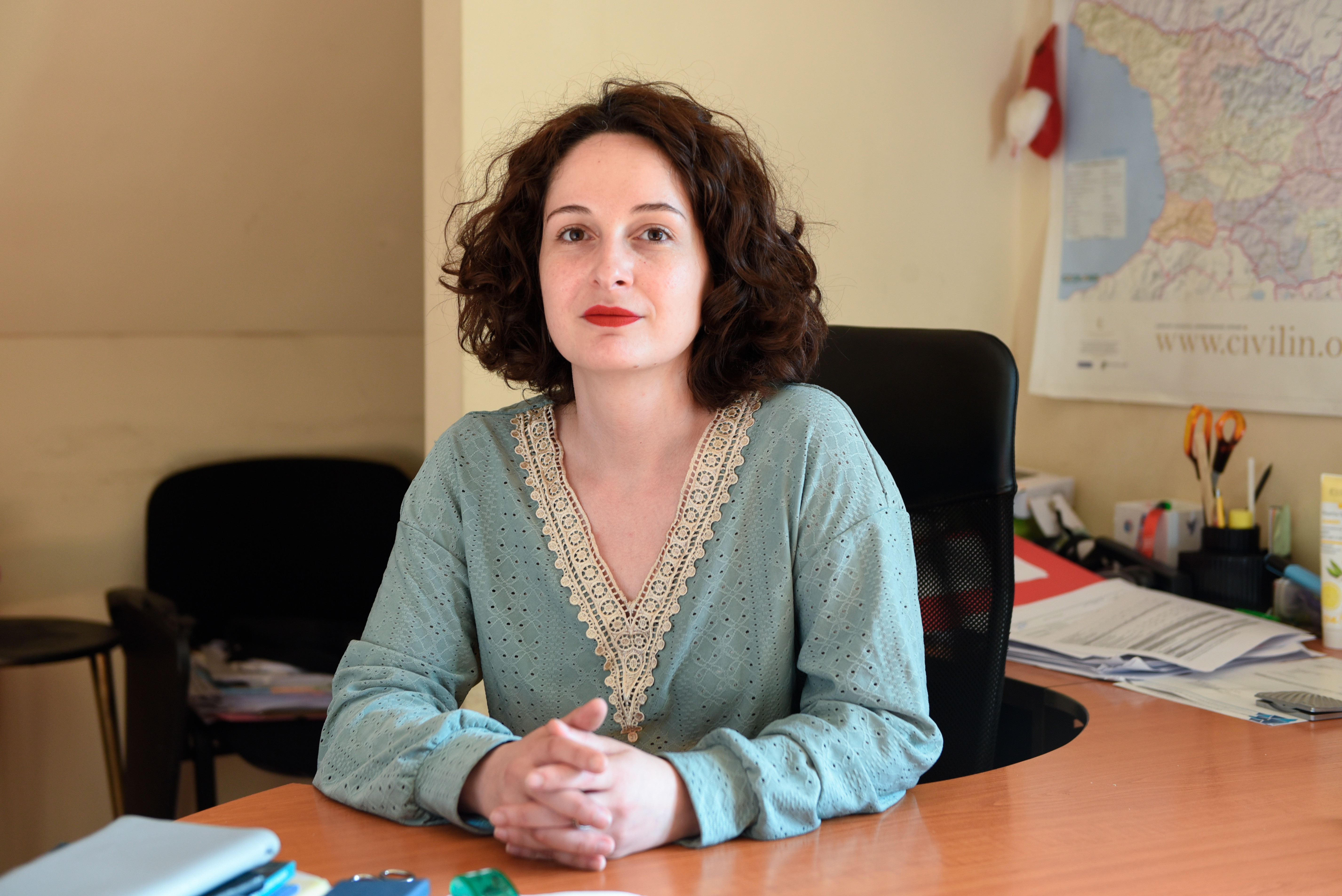
Thanks to the support and increased brand awareness, Tene has now been able to secure several significant partnerships.
First steps
Tene's story began in 2019 when Sandro first ventured into the realm of importing branded cables from China, as the first Georgian USB cable brand. Encouraged by the favourable reception from the public, he resolved to transition towards manufacturing Georgian USB cables and travelled to China to procure the necessary equipment for this endeavour.
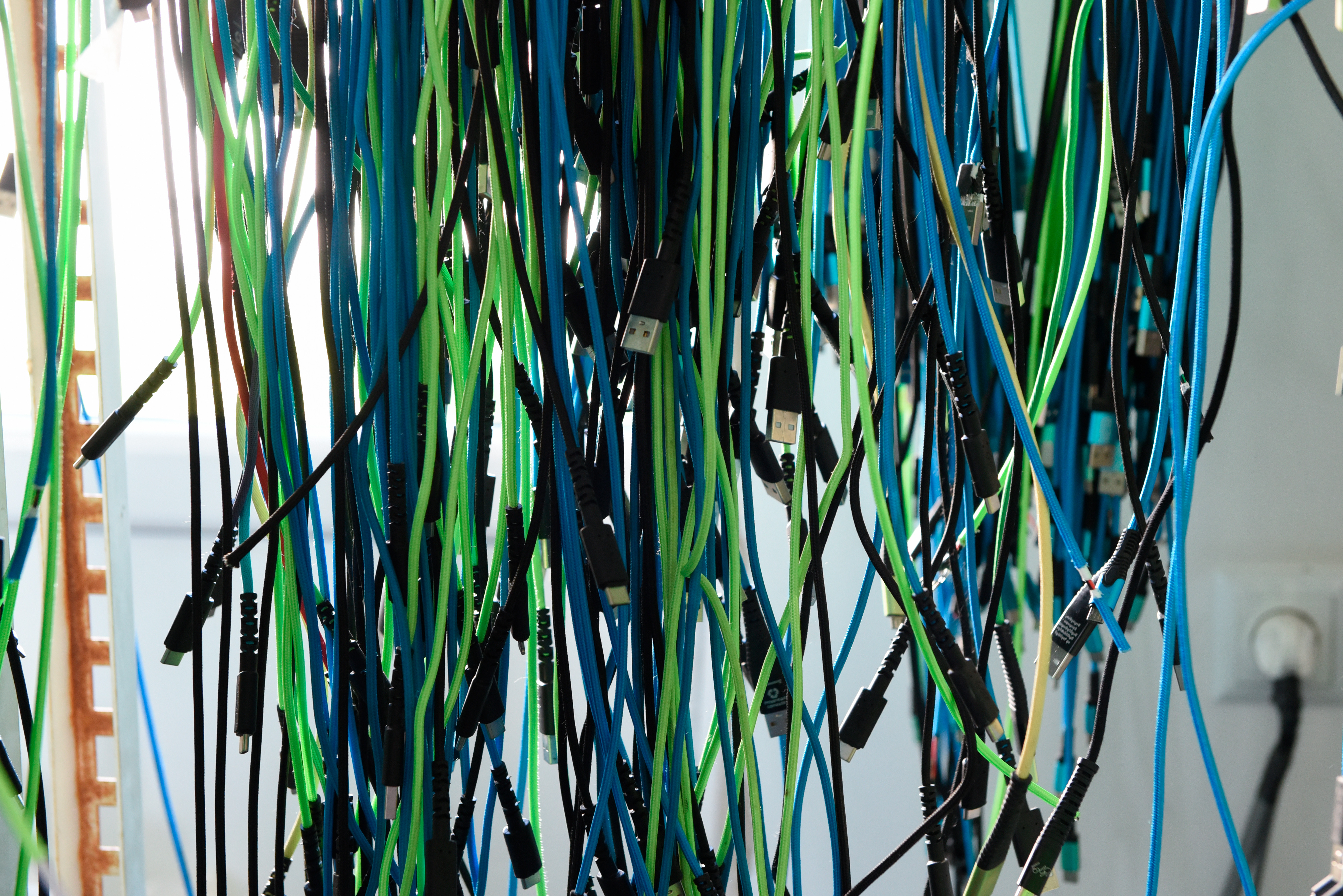
Sandro and Tene’s first steps turned out to be quite challenging, not helped by delays cause by the pandemic. The devices finally arrived in early 2020, and Sandro arranged them in a designated space, but the principal challenge still lay ahead:
"I expected that each item would come accompanied by clear instructions, guiding my actions. But there was no such guidance - no instructions at all. Furthermore, expertise in these technologies in Georgia was notably lacking. The task of initiating a video call and obtaining assistance proved very challenging, and, our interpreter was unable to grasp intricate nuances. And so, I found myself reliant solely upon myself," Sandro recalled.
For about a year, he spent every day at the factory, striving to make sense of the technology. "I made 500 to 600, perhaps even a thousand attempts daily across various devices to get it to work," he told me. The sounds and operational principles of every device had become ingrained in his memory, yet tangible progress remained elusive.
"It had been a year, and I still couldn’t put together this USB cable successfully. I reached a point where one day I found myself disheartened, pondering over the considerable sum of money expended and numerous commitments undertaken, including those made to the public. I had pledged to accomplish this task, publicly stating my intentions to friends, family, and everyone..."
Facing this crisis, expecting loss and profound shame, he had already made the decision to quit the business. The fact that he was diagnosed with the coronavirus during this very period, aggravated his condition.
"Late at night, at 12 o'clock, I came home from the factory, disheartened by failure. Yet, the morning arrived, the night’s sleep did its work and hope renewed its gentle grip. I gathered my strength again, went to the factory determined to try once more, hoping fortune would favour my efforts. And as fate would have it, it worked out exactly that day – the day I was going to quit, it worked out," Sandro said, and added, “One must never surrender.”
What does Tene do?
One of Tene's objectives is to reduce plastic pollution in by collecting discarded plastic and repurposing it into USB cables. This mission has met considerable success – not only do people dispose of their used plastics responsibly, but they also collect plastic waste from the environment.
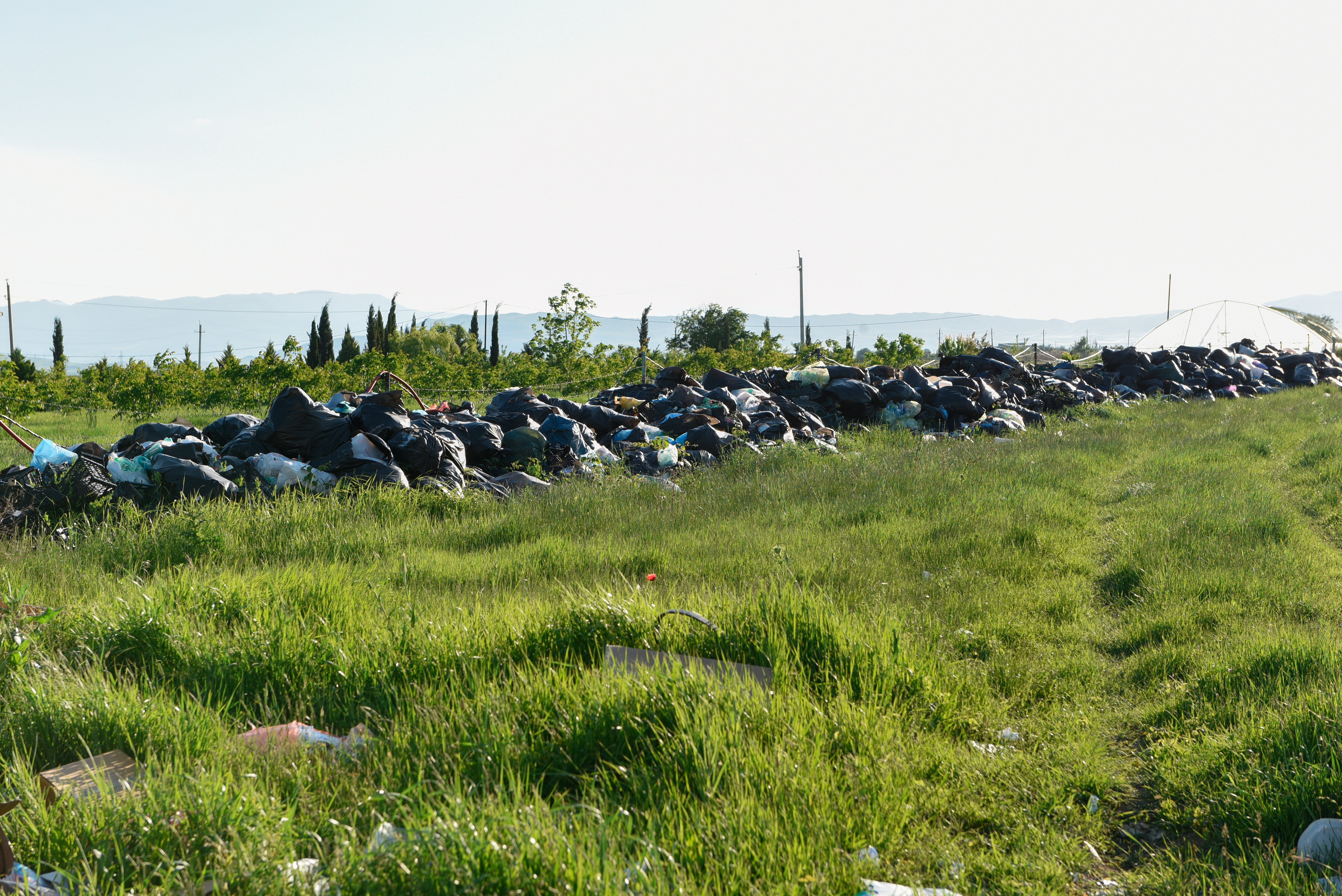
"It often happens that they bring bottle caps covered with soil, which delights us - this means that someone has dug up the plastic from the soil and brought it."
Plastic waste can be delivered to Tene at various locations. You can bring it to their office (Sukhumi Street 4a, Tbilisi) or to their enterprise in Tserovani. You can also deposit plastic in Tene’s green boxes available at many schools and organisations.
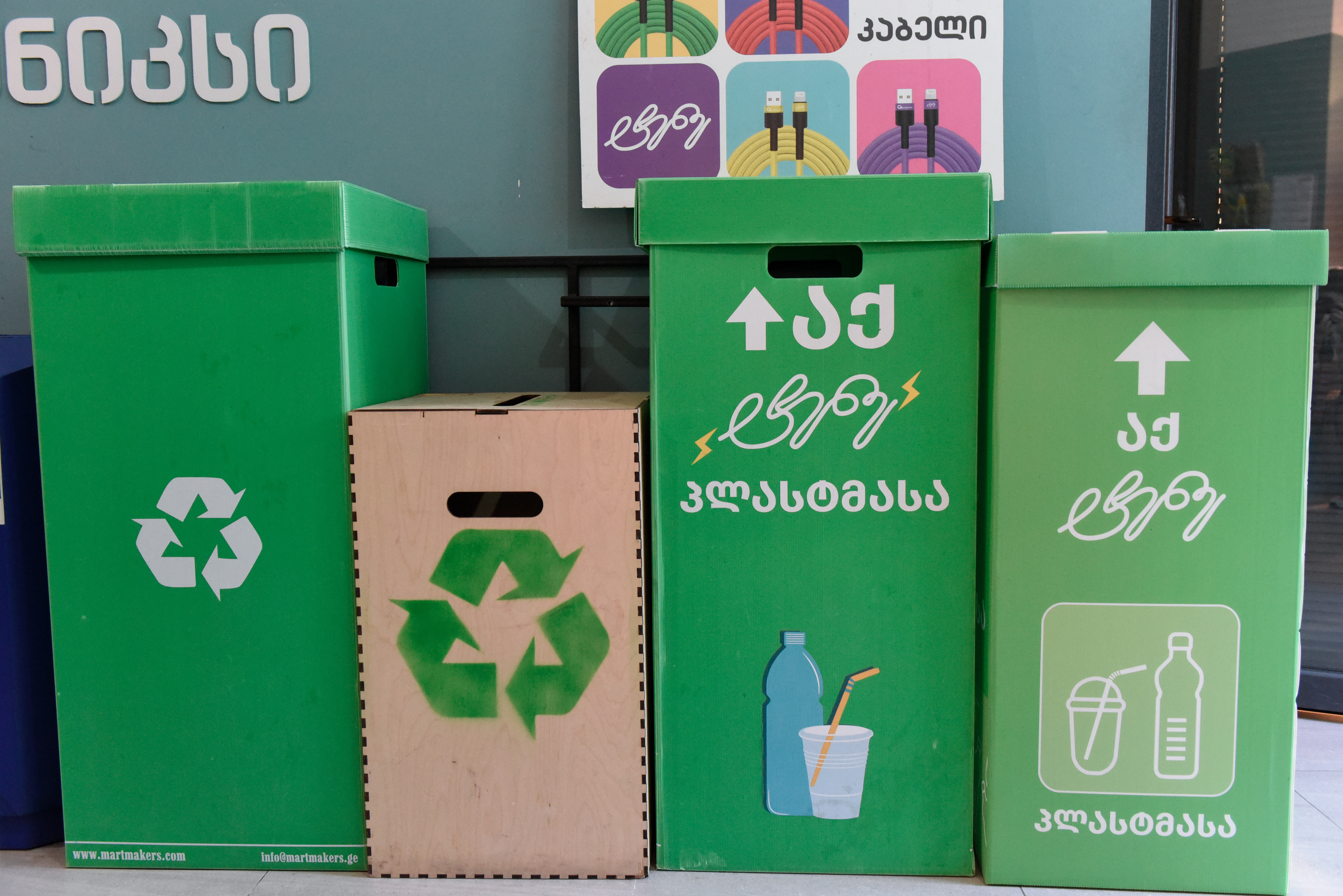
The plastic is subsequently transported to the factory in the Tserovani IDP settlement. There, interested visitors, including schoolchildren, are hosted and educated about the production process.
Once the collected plastic arrives at the facility, the bottle caps are gathered and fed into a specialised machine for processing. As a result, a crushed mass is obtained.
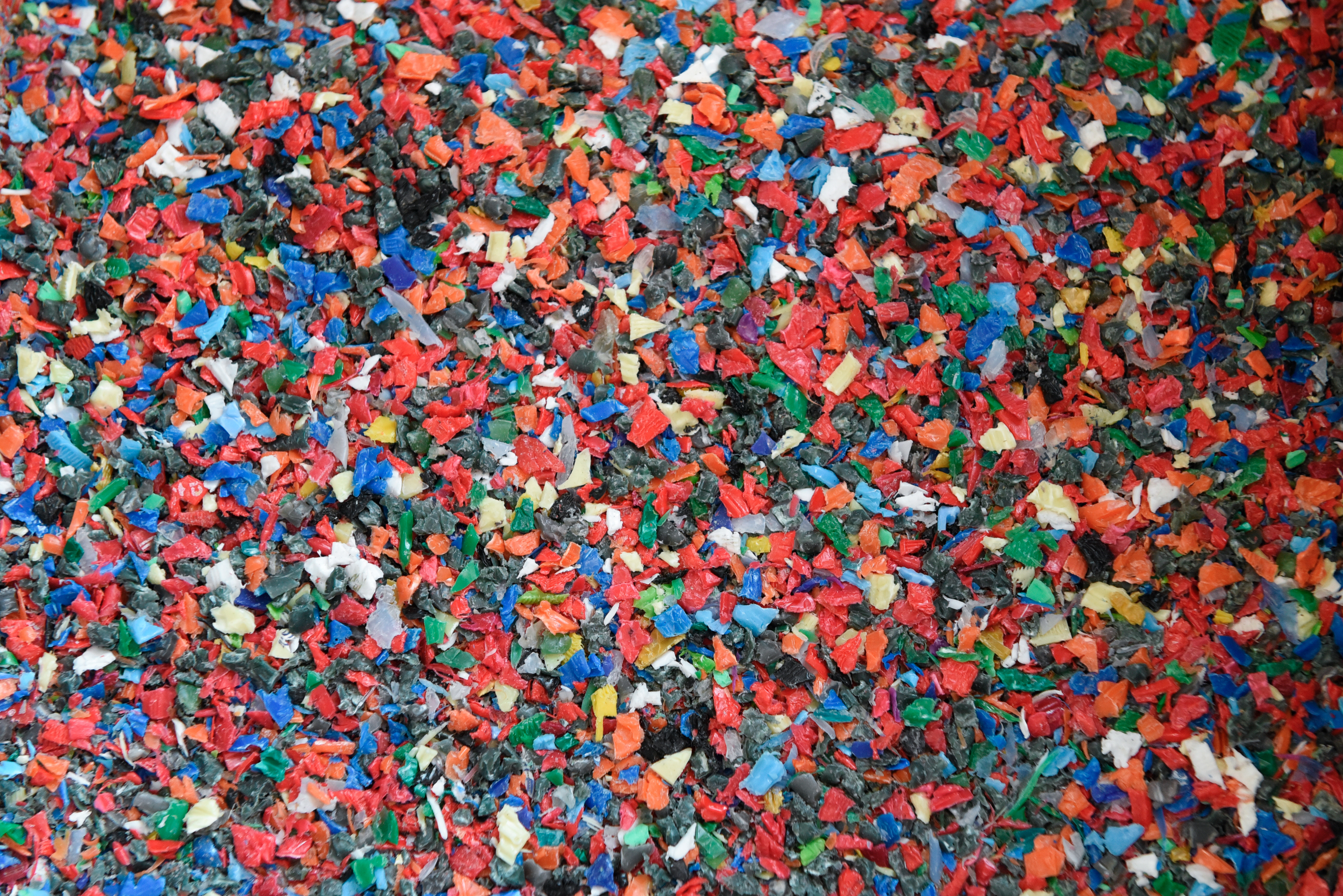
The material then passes through at least ten machines and undergoes various procedures.
The outcome of all these efforts appears as follows:
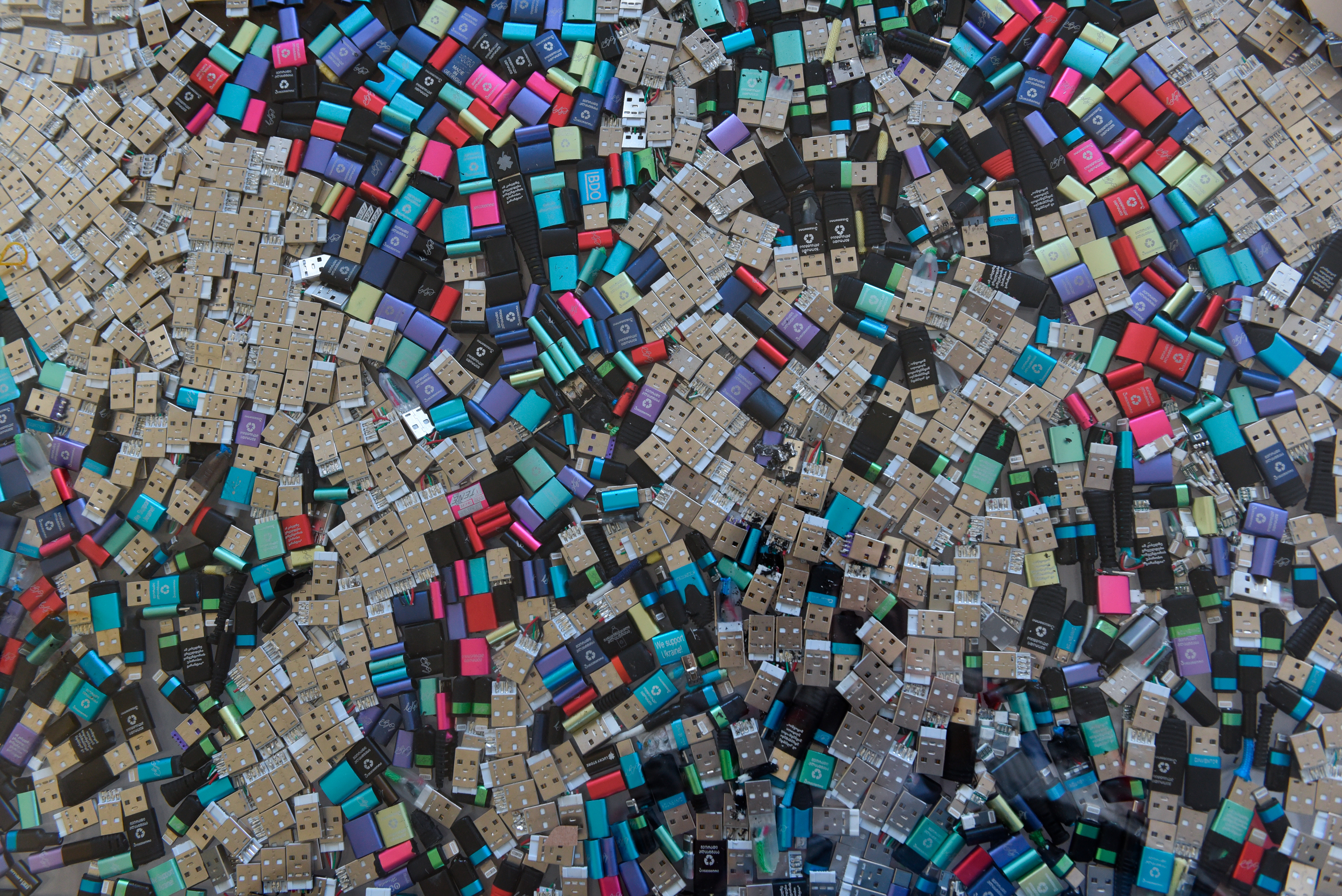
Finally, the products undergo branding, presenting consumers with a wide variety of options. Cables vary in both compatibility and length.
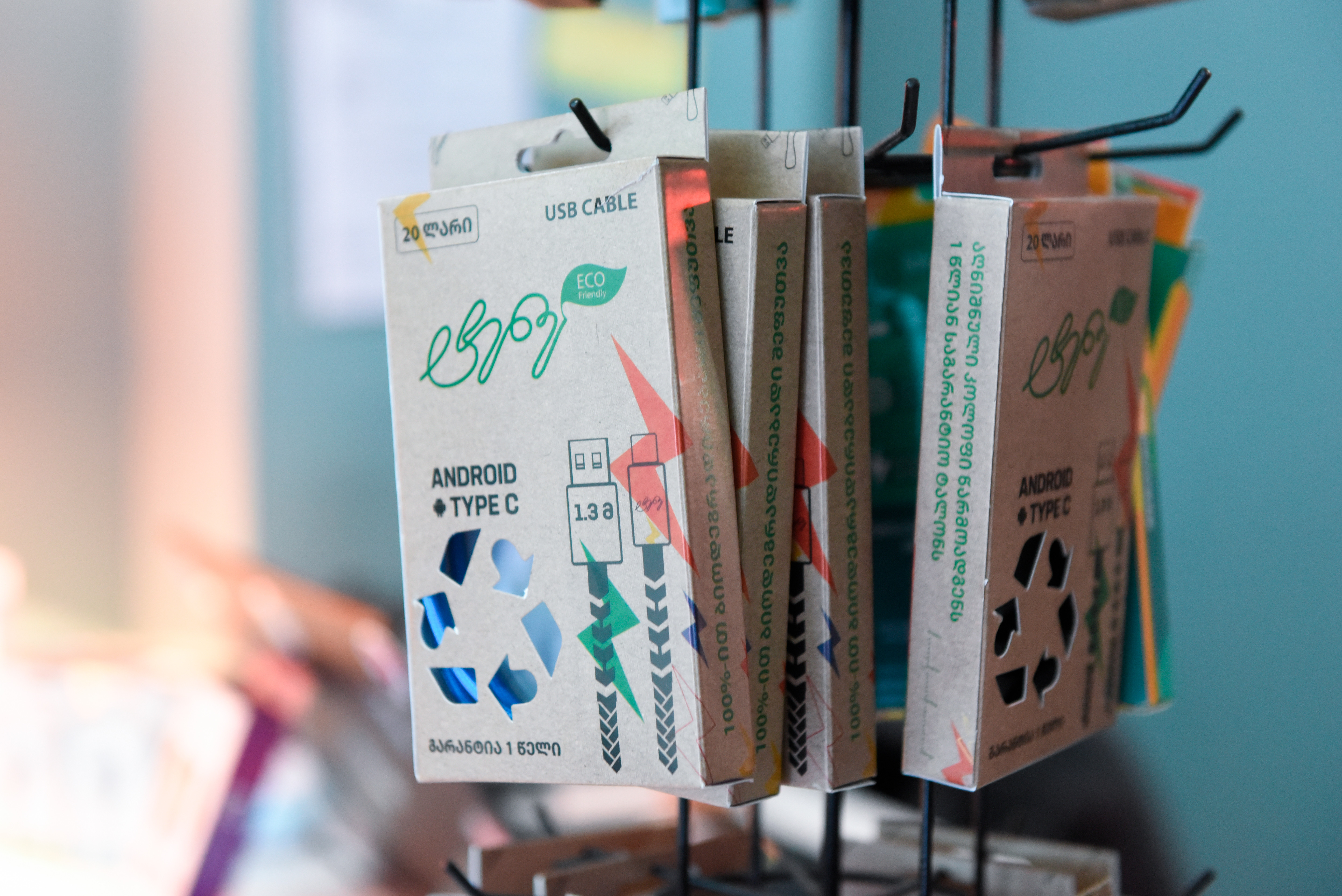
Alongside crafting USB cables, Tene has also created a device for swallowing bottles. They also have plastic cup collectors positioned nearby the water dispensers.
Tene products are available for purchase on their dedicated website as well as at numerous chain stores.
Tene’s challenges
Sandro identifies competition with China as one of the paramount challenges for Tene. Upholding low pricing while earning consumer trust compared to foreign counterparts is difficult for Georgian products. Nevertheless, Tene manages to accomplish this:
"We sell quite a lot of cables, and this trend is fortunately growing due to our unwavering commitment to high quality and customer loyalty," the founder explained.
The challenge persists due to the lack of refineries and key markets:
"We gather plastic, though in insufficient amounts, highlighting the need for additional collecting enterprises. Another problem is the fluctuating price of plastic, and sometimes it is difficult to sell. We collect much more than we use, but the problem is selling it a normal price, necessitating subsidies from both non-governmental organisations and the state. Without such support, our endeavours risk to be inefficient," explains Sandro.
Fortunately, Tene is definitely not alone in this venture.
Helping hand of Actio
The Social Impact Fund Actio is helping Tene in expanding its scope of operations.
"Actio stands as the first social impact fund in Georgia, founded in 2022 by the Centre for Strategic Research and Development of Georgia (CSRDG), with the support of the European Union. Guided by the stewardship of Impact Europe, the project ‘Collaborate for Impact’ has been running since 2020. It was this project that gave us the opportunity to expand the scope of our social entrepreneurship and create the impact fund," explained Christine Kandelaki, the manager of Actio.

She asserts that social entreprise in Georgia finds its principal backing from international donors, with the European Union standing out as one of the principal supporters. Furthermore, Actio collaborates with local investors to bolster social enterprises.
"Actio, as an impact fund, receives resources not only from EU funding, but our goal is to develop an impact-oriented investment ecosystem and a kind of culture on the ground in Georgia. We work with local investors who support social enterprises with the help of Actio. Accordingly, with local and international resources we create this opportunity for social enterprises."
The launch of the Impact Fund stemmed largely from the recognition of a critical challenge: unlike start-ups, financial support is less available for established social enterprises. Furthermore, social enterprises in Georgia do not have adequate legal status, rendering access to banking services a formidable barrier.
Against this background, Actio’s goal is to foster the development of social enterprises within five years of inception, providing both grants and loans, alongside technical support.
"Along with financial support, Actio engages in long-term partnerships with social enterprises, provides organisational development by offering consulting services while actively collaborating with them on planning and evaluating social outcomes and impacts,” said Christine.
Tene stands as a prime example. Interested by the prospect of collaboration, Sandro filed an application. Following the decision by the Investment Commission, Tene earned its place within the fund's portfolio. This is how the expansion of Tene's activities began:
"The waste delivery and collection system predated Actio in Tbilisi, while Tene was acting in a more fragmented manner across the regions. You will find Tene green boxes for waste collection in schools and organisations in Tbilisi. Additional collection points exist, yet Actio allows Tene to go beyond Tbilisi, facilitating organisation across diverse regions. Consequently, residents beyond the capital can now participate in plastic collection and delivery to Tene," Christine said.
Actio helped Tene to purchase the equipment. And while some financial aid remains, the commitment to support persists beyond their depletion: "Over the next five years, our collaboration with them will be steadfast to ensure the development of the enterprise. We plan to increase the number of collection points and the amount of plastic collected, as well as boost communication and promotional activities,” Christine said.
Following Tene's inclusion in the portfolio, it has held over 20 meetings with kindergarten children, and school and university students. Ultimately, over 600 people attended these meetings. Tene's green boxes were placed in approximately fifty schools and fifty private companies.
Sandro, as the author of a success story, advises entrepreneurs to address a social problem with their ventures. He encourages them “to focus not only on profit and consumption but also on contributing positively to society, as this contribution will be appreciated by the community.”
Author: Mariam Ramazashvili



